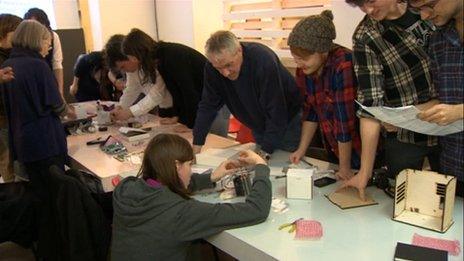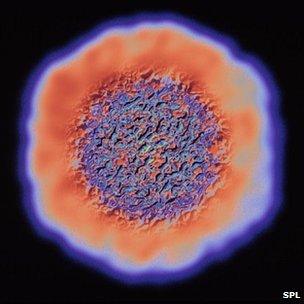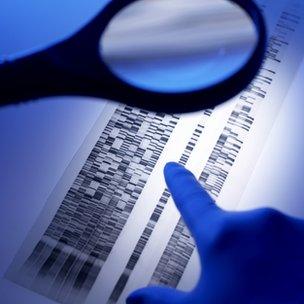Early days in a DIY biological revolution
- Published
- comments

Young scientists and enthusiasts can now gather for do-it-yourself biology
In a back-street in Manchester's old garment district, now buzzing with students and bars, 20 or so people have gathered to do something unimaginable even a few years ago.
They are here for a session of MadLab, external, a science club, and this evening is devoted to amateur biology.
But this is not your typical study of butterflies or pond life. This is DIYBIO, external, part of a movement that began in the US, and the goal is to play with genes, to manipulate nature.
The task tonight is to assemble a newly-delivered piece of equipment: a PCR (polymerase chain reaction) machine, external, a device which takes short strands of DNA and copies them.
Until recently it would have been affordable only to scientific institutions.
But this one cost a few hundred pounds. Advanced technology is tumbling in price, and is becoming a new power accessible to all.
Amateur role
The atmosphere is excited, the different components hurriedly assembled.
The organiser, Asa Calow, believes in the value of the amateur.
He says the industrial revolutions brought about by steam and computing were driven by creative individuals - think Bill Gates and Steve Jobs in California in the 70s, toiling in garages, changing the world.
The coming revolution will be biological and DIY will play a key role.
The group's next step is to buy a machine that not only copies DNA but makes it to order: a gene synthesiser.
A typical price on eBay? Well under £1,000.
This would enable the amateurs to create new genes and therefore, in theory, new kinds of organisms.
It is at this point that, for some, an alarm bell rings.
What if enthusiasts cook up some new synthetic organism that proves unexpectedly harmful and then accidentally slips out, poured down a drain or stuck to a poorly washed hand?
Bio-error risk
Stranger things have happened for real. In 2007 foot-and-mouth virus escaped from the labs at Pirbright in Surrey.

A foot-and-mouth virus leak has added to collective concerns about synthetic biology's rise
As I reported at the time, external, work was under way on a vaccine for the disease when the leak happened.
There's even a name for this scenario: "bio-error".
Asa tells me he and others will follow every bio-safety regulation "to the letter" to avoid anything going wrong.
A code of conduct for amateurs will guide every step.
But what about unintended consequences, not only of enthusiasts making mistakes but also the dozens of academic laboratories and corporate researchers in the US, China and the UK?
Three years ago, Lloyd's of London identified synthetic biology as an "emerging risk" for insurers.
They produced a report, external describing it as a "new and exciting technology" but also warned of unforeseen hazards.
"It is possible that two or more benign strands of DNA will interact so that the risk is far greater than the sum of the parts.
"In the lab this risk is, arguably, containable; even in a contained industrial process it is manageable; but loose in the environment the risks are far greater."
Commercial block
Last month a coalition of more than a hundred environmental groups endorsed a report calling for a moratorium, external on the commercial release of any products of synthetic biology.
The study describes the new science as "extreme genetic engineering", a signal that the decades-long opposition to genetic modification (GM) is set to continue.
It argues that current safety regulations are inadequate for such a radical new technology.
Multinational companies could end up patenting and owning whole industrial processes and the feed stock needed for engineered bacteria will most likely be grown in developing nations displacing food crops.
Another concern has been raised by military analysts: the risk of so-called bio-terror from new forms of deadly biological weapons.
The same arguments were raised when GM emerged.
In an interview 20 years ago, Prof Malcolm Dando of Bradford University told me that GM was a technology with "dual uses" - benign and malign.
It could produce life-saving drugs or dangerous organisms.
Now he says the same is true of synthetic biology - not immediately, but in the long-term.
He surveyed some 3,000 scientists working in life sciences to ask if they were aware that their work could have two uses.
What he found was that, external very few had thought about it.
International regulation
So what are the options? The Woodrow Wilson International Centre for Scholars runs a project, external that aims to find answers.
It has drawn up a plan for careful oversight and tighter international regulation.
The goal, according to the project's director David Rejeski, is to maximise the benefits and minimise the risks.
Similarly, a report by the London School of Economics, external calls for a flexible and evolving "art of governance" to ensure a dialogue continues between every group involved.
In the early 90s, GM was launched with a series of spectacular own-goals - big business seemingly foisting weird new foods on an unsuspecting public for the apparently sole purpose of boosting profits.
The synthetic biologists are desperate to avoid a repeat. Ethics and safety, they say, are built in from the start of each project.
Organisms are designed with "suicide switches" so they self-destruct if they escape.
The first products, such as detectors to spot parasites and infections, will be as overtly useful as possible.
But will people be more accepting than they were of GM when it first appeared?

As juggling the biological alphabet becomes cheaper and easier, new ethical challenges will surely arise
In 2009-10 two UK research councils - the Biotechnology and Biological Sciences Research Council (BBSRC) and the Engineering and Physical Sciences Research Council (EPSRC) - canvassed the views of 160 members of the public.
The researchers found 'conditional support' for synthetic biology , externalbut also fears about control, benefits and impact.
The key conclusion was that current laws may not be adequate to provide robust oversight.
So expect the question of regulation to loom larger in coming years as the momentum behind this new science builds and becomes more affordable.
Listen to the excited chatter at MadLab in Manchester and you'll believe that this offers great opportunity.
Watch the researchers at work and you sense the passions that come at the dawn of a new era.
Read the reports of the environmental campaigners and we face a nightmare future.
So where will this lead? As with the early days of all revolutions, it's too soon to tell.